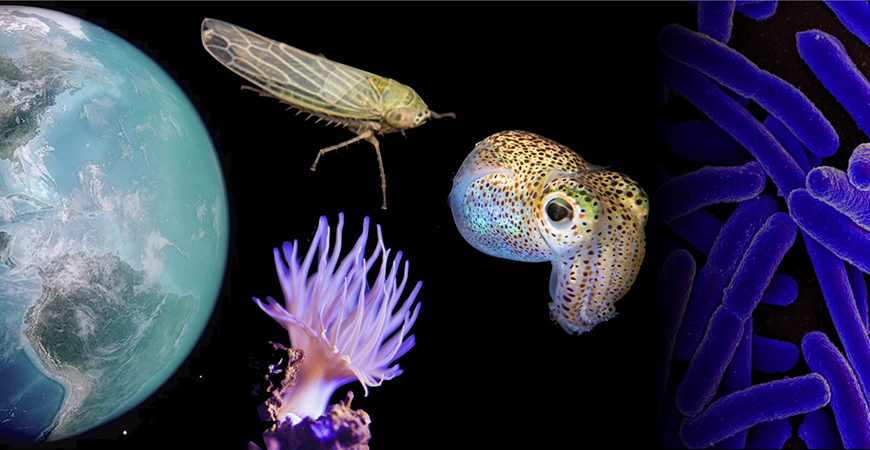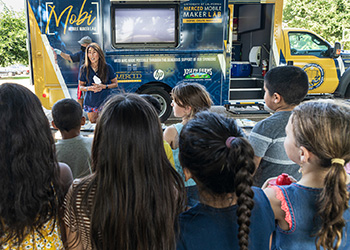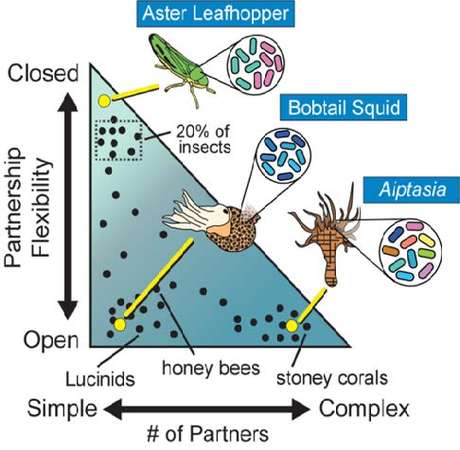
UC Merced has received a $12.5 million grant funded by the National Science Foundation (NSF) to develop the Biology Integration Institute (BII): INSITE — the INstitute for Symbiotic Interactions, Training and Education — a research collaborative that aims to expand the fundamental knowledge of symbioses and inform immediate and long-term conservation strategies
A multi-disciplinary team from UC Merced, Michigan State University (MSU) and Resilient Oceans will look at
“There's a lot of funding directed toward climate change, but everyone is looking at what you can see.
BII-INSITE officially began Sept. 1 through a five-year agreement with NSF. As one of the campus’s largest institute grants, it will create a framework for how researchers in the field

The INSITE team spans a broad range of researchers including biologists, chemists, mathematicians and conservation ecologists:
-
From UC Merced (in addition to Nishiguchi)
-
Co-principal investigators
professors Gordon Bennett, Maggie Sogin and Erica Rutter in the departments of Life and Environmental Sciences, Molecular and Cell Biology and Applied Mathematics, respectively, -
Professors Chris Amemiya, Marcos Garcia-Ojeda and Juris Grasis, in the Department of Molecular and Cell Biology; Professor Michael Dawson in the Department of Life and Environmental Sciences; professors Shilpa Khatri and Suzanne Sindi in the Department of Applied Mathematics; and Professor Michael Thompson in the Department of Chemistry and Biochemistry
-
-
From MSU
-
Co-principal investigator
Professor Elizabeth Heath-Heckman in the department s of Integrative Biologyand Microbiology and Molecular Genetics -
Professor Kevin Liu in the Department of Computer Science and Engineering
-
-
Consultants
-
Annick Cros, conservation ecologist, Resilient Oceans and Moss Landing Marine Laboratory
-
Patricia Campbell, assessment coordinator, D. Campbell-Kibler Associates, Incorporated
-

An Integrative Team Approach
Nishiguchi explained what makes the team’s approach distinctive from other BIIs is its vision to develop experimentally
“We’re using symbiosis as a model. The vulnerability of most species to climate change cannot be evaluated directly, nor through one biology discipline,” she said. “That’s where Anni
Rutter is lead on modeling and will take the experimental data from the lab and field to develop mathematical models
The team has selected a suite of organisms that cover basic modes of known symbiotic associations, ecological alliances (terrestrial and marine) and scaling complexity — bobtail squid (Nishiguchi
“I think what is particularly
Heath-Heckman will lead the institute’s long-term evolution experiments with different systems in response to climate change.
“I study the mechanisms by which bacteria influence development and physiology in their hosts,” she said. “I am interested in how both short- and long-term climate change can affect the host and the way the host associates with its bacterial symbionts.”
I think what is particularly important about our efforts is that we’re directly linking our research to species conservation in order to be effective and successful.
Improving Science Communication
Amemiya,
“One of the big goals of our institute is to be able to have students flow between disciplines and be comfortable doing that,” Heath-Heckman said. “Being trained in different techniques is wonderful, but to also have a strong basis in two different worlds will mean they are prepared for whatever they want to do, whether it be research, biotech or anything else, and they will have fluency in multiple scientific languages.
“And we're uniquely positioned to do that because we have people from all these different disciplines who are willing to work together.”
Other components of the grant will include educating K-12 students and outreach to the public about the importance of symbiosis in maintaining biodiversity in the face of a quickly changing climate.
The INSITE team will work with affiliates and centers including the UC Merced NSF-CREST Center for Cellular and Biomolecular Machines, the Joint Genome Institute, UC Davis Bodega Bay Marine Laboratory, UC Merced Sierra Nevada Research Institute, UC Merced Health Sciences Research Institute, and the UC Merced Center for Information Technology and Research in the Interest of Society.
“The whole is greater than the sum of the parts because we can’t do this on our own,” Nishiguchi said. “We're all working together to ensure that decisions that are going to be made in real life are going to be applicable and facilitate solutions to of some Earth’s immediate climate concerns.”
Brenda Ortiz

Senior Public Information Representative
Office: (209) 228-4203
Mobile: (209) 628-8263






